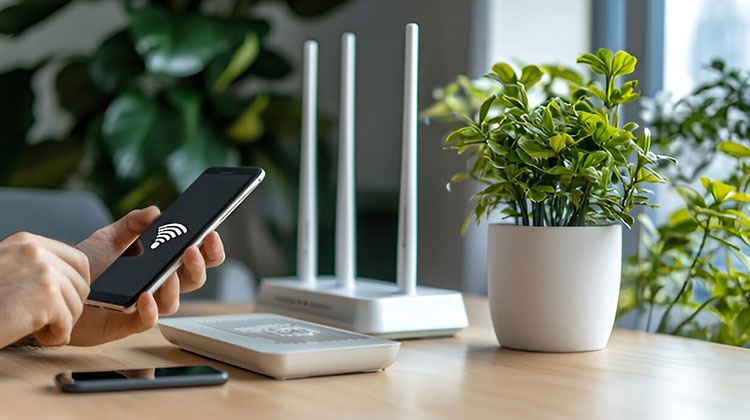If you have inadequate Wi-Fi coverage in one portion of your office or home, there are two primary options to increase coverage: A WiFi booster vs WiFi extender. In simple terms, tell us what the main difference between these two is, and which is most suitable for you?
In this thorough guide, you’ll be able to compare WiFi booster vs WiFi extender face-to-face and how they function and their benefits and drawbacks, and their best use. Check out the article to determine whether a WiFi booster vs extender is the right choice for you.
WiFi Booster vs WiFi Extender: Understanding the Basics
WiFi Booster and WiFi Extender share the same goal in that they act as Internet boosters to the existing Wi-Fi network and connect you to places where the internet isn’t as good.
What is a WiFi Booster?
A WiFi Booster will be a gadget that is designed to increase the coverage and strength of your internet connection. It works by amplifying your existing WiFi signal coming from your router, and then extending its coverage to areas of your home or office where there is a weak signal or absent.
WiFi signal boosters are especially beneficial in large areas in areas with walls, or places where interference may interfere with the flow of signal.
There are several kinds of WiFi boosters. For instance, windows or wall-mounted boosters operate by capturing weak router signals from a particular area and then broadcasting them at an increased intensity to areas that have low reception.
Also read: What is xFi Complete? Features and Price (2025 Guide)
What is a WiFi Extender?
A WiFi extender is a device that wirelessly connects to your router’s network by using Wi-Fi Protected Setup (WPS) and manual setup to copy the name of the network (SSID) along with the username and password. It then makes use of its built-in antennas to broadcast the extended network to remote areas that are not within the reach of your router. Modern mesh extenders like Netgear Orbi can even wirelessly connect several units to provide total coverage across your entire home.
If your laptop, phone, or any other Wi-Fi-enabled device is able to detect the shared SSID and connects to the access point, that is the most powerful – either the extender or your initial router network. It acts as a large, extended wireless system. When you move between your office and home, your device will seamlessly switch between access points.
WiFi Booster vs WiFi Extender: What’s the Difference?
After you have mastered fundamentals, what is the main difference between a WiFi booster vs extender? Let’s see how they function:
Extenders establish new connections by wirelessly connecting to existing networks and then rebroadcasting the signal with their antenna built into them. This increases the overall coverage area.
The boosters simply amplify and enhance the Wi-Fi signals of your router’s native signal. While they can boost the speed of wireless connections and decrease dead zones, their range is still limited to the router’s connectivity to the internet and its antenna.
WiFi Booster vs WiFi Extender: Which to Choose?
Do you need to get a Wi-Fi signal booster or a Wi-Fi range extender? The best choice is based on the needs of your wireless connectivity:
Where to Use a WiFi Booster
Boosters are great for those who have:
- A generally strong router Wi-Fi signal with some isolated dead areas
- It is necessary to improve speed in certain rooms that are out of range of coverage.
- A large home where buying multiple extenders is expensive
Where to Use a WiFi Extender
Extenders are most effective when you need:
- Significantly increase the coverage of Wi-Fi across floors or rooms
- Make wireless connectivity available to a garage that is detached or a backyard patio
- Give wired access to devices to distant devices using the Ethernet ports on extenders.
- Create a mesh network using multiple access points across large houses
Also read: What Is a WiFi Pineapple? 5 Easy Ways to Protect Yourself
Pros and Cons: WiFi Booster vs WiFi Extender
There are also important benefits and drawbacks to take into account when evaluating WiFi boosters vs WiFi extenders.
WiFi boosters
Pros:
- Affordable price than purchasing multiple extenders
- Simple plug-and-play installation
- Increase signal strength precisely when you need it
- Provide Wi-Fi connectivity to larger dwellings
- No additional network configuration is required.
Cons:
- Limited to improving the existing router signals
- Doesn’t extend the coverage area overall.
- There aren’t any additional Ethernet ports for wired devices
- It is essential to place the right spot for the best performance
- In a large home, buying multiple WiFi extenders can quickly become costly.
WiFi Extenders
Pros:
- The Wi-Fi network expands its coverage
- Flexible positioning within the coverage of the router’s WiFi signal
- Ethernet ports permit the connection of wired devices.
- Mesh systems connect multiple devices to deliver seamless, whole-home WiFi coverage
- No more signal drops as you move around your house or property.
Cons:
- More expensive to deploy multiple extenders
- Each extender hop may slightly lower the speed of data transmission
- It requires Wi-Fi access to the router’s network to ensure the best positioning
- Additional setup and configuration are required.
Final Remarks
WiFi signal boosters and WiFi range extenders employ two distinct methods to improve the performance of wireless networks. The boosters simply amplify or enhance the router’s connections. Likewise, extenders boost networks by repeated signals, which eliminate dead zones.
I hope this comparison. A WIFI booster vs extender comparison in-depth gave all the details needed to decide that the difference between an extender and a booster is the best option to upgrade to get a better connection. If you have any additional queries regarding the top Wi-Fi devices to get rid of the annoying dead zones, tell us.















Leave a comment